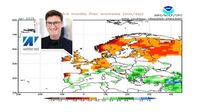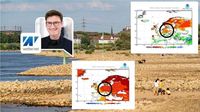Germany is bracing for a potentially severe drought and heat wave this coming summer, as alarming weather forecasts indicate that April 2025 could be one of the driest months in recent history. According to meteorologist Dominik Jung from wetter.net, current calculations from the long-term Climate Forecast System (CFS) model suggest that large parts of the country may experience significantly below-average rainfall, with only the northeastern regions expected to receive normal precipitation levels.
As temperatures rise, predictions show peak values of 25 or even 26 degrees Celsius for the first weekend of April, a stark contrast to typical early spring weather. "If this high-pressure influence continues to dominate, Germany faces a hard drought and heat summer, with parallels to 2018 and 2019 already evident," Jung warned.
The situation is exacerbated by March 2025 being recorded as one of the driest months in over 140 years, with February also falling short at around 50 percent of usual rainfall. The CFS model had already issued warnings back in January about the potential for a dry March, which has unfortunately come to fruition. This trend is concerning, as the country moves toward a spring drought that could set the stage for extreme heat conditions later in the year.
Jung noted, "The high-pressure systems have dominated for weeks and will apparently continue to do so." This shift in weather patterns is troubling, especially as southern Europe grapples with heavy rains and flooding while Central Europe, including Germany, dries out.
The forecast for the next two weeks is equally grim, with virtually no significant rainfall expected across Germany. This lack of precipitation not only threatens agricultural productivity but also significantly raises the risk of forest fires. The dry conditions are already stressing the soil and vegetation, leading to fears that if a heat wave occurs, it could exacerbate the situation, creating a vicious cycle of drought and heat.
Experts emphasize the importance of monitoring this evolving weather situation closely. Jung pointed out that the absence of moisture in the soil reduces the natural cooling effect of evaporation, which can lead to higher air temperatures. "A dry landscape can trigger a dangerous feedback loop, where drought intensifies heat and vice versa," he explained.
As the summer approaches, weather forecasts suggest that temperatures around or above 40 degrees Celsius could become a reality, making the potential for a record-breaking summer increasingly likely. This scenario raises significant concerns not only for the agricultural sector but also for urban areas, which could experience heightened heat due to the lack of moisture.
Jung's warnings are echoed by other meteorologists who point to the alarming trend of increasing hot days and tropical nights. As the climate continues to shift, the risks associated with extreme heat could pose serious health threats, especially for vulnerable populations like the elderly and children.
In summary, Germany's weather outlook for the coming months paints a troubling picture. With a dry April on the horizon and the potential for a scorching summer, it is essential for authorities and citizens alike to prepare for the challenges that lie ahead. The interplay of drought and heat could have far-reaching implications, making it a critical issue for the nation as it faces an uncertain climate future.



